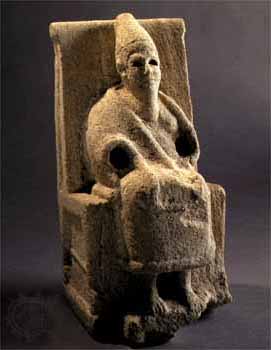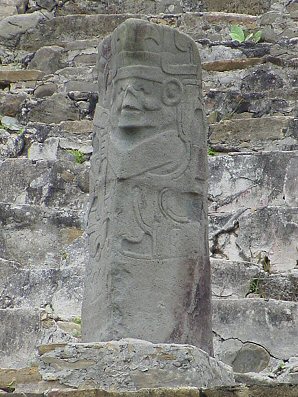The Gods
There are an incredible number of Ancient Egyptian Gods, one for almost every situation and place. Many of the Gods began as local deities and were later organised and merged with others to form either a Triad or an Ennead (nine). There were several large schools of theological thought in Egypt, and each proclaimed its superiority over the others. A ruling dynasty would often promote their chief local god to the chief national god. For example, Amun (associated with Thebes) did not become a major deity until the shift of power to Thebes in the Middle Kingdom.
Many Gods share characteristics and epithets at different times in history. For example, Sekhmet (the lion Goddess of Memphis), Mut, Tefnut and Hathor are all given the title 'the Eye of Ra' and given the task of protecting the sun god. There is often confusion about the different gods known as Horus. For example, Horus the elder was often thought to be the consort of Hathor, while Horus the younger was the son of Isis and Osiris. This is unsurprising given that the Egyptian civilisation survived for over three thousand years, and the religious system was constantly evolving. In pre-dynastic times, religion was largely animistic (they considered certain animals, plants and geographic features to be the homes of spirits). Many gods are represented by totemic animals based on the ancient understanding of the role or characteristic of the animal. For example, Anubis (the Jackal) was associated with the dead and funeral arrangements because jackals were often seen on the edge of the desert where the Egyptians were buried. It was considered that the jackals guarded the souls of the deceased. As the Egyptians were dependent on the flooding of the life-giving Nile, it is hardly surprising that water deities (such as Hapi and Aunket) and agricultural deities (such as Osiris) would be popular. As their civilisation developed, the gods took more human form and multiplied in number. Cosmological deities (such as the sun and moon) and gods of warfare and hunting soon followed.
Even during the "Atenist heresy" of the Armarna period (when Akhenaten rejected the old gods in favour of the Aten disk) Egypt was not fully monotheistic. Akhenaten himself claimed he would maintain the cult of the Apis bull and representations of Bes (the god of childbirth) were found in his capital city. Furthermore, he and his queen, Nefertiti were often likened to Shu and Tefnut. However, it is clear that monotheistic Christianity adopted, modified and simplified many of the symbols and myths of the ancient polytheistic religions, in particular that of the Egyptians.

The Father God El
EL is the supreme creator god of the Canaanites who lives with the other gods on Mount Zaphon (similar to Mount Olympus of the Greeks but located at the mouth of the Orontes river near the border between Turkey and Syria). He is the father of all the gods and men and is often addressed as such by the Canaanite gods. He is the god of the earth and the air who is represented by a bull. He is derived from the Sumerian god AN.
In the Bible EL is translated as God. Elohim is the plural form of EL yet in most places in the Bible it is used in the singular sense so it is also translated as God instead of gods. Strict monotheism was not fully developed in Israelite thought until their exile to Babylon. Before then Yahweh (translated as Lord in the Bible) was the god of Israel and Judah (officially their only god) whose principle power and characteristic was that of justice and righteousness. Because he judged other peoples and gods he soon came to be seen as the supreme God (the equivalent of EL), and finally as the only God for all people. Echoes of Israel's earlier stages of understanding are found in some old psalms as follows
-
Psalm 82:1: Elohim has taken his place in the assembly of EL, in the midst of the elohim He holds judgment.
-
Psalm 29:1: Ascribe to Yahweh, O sons of EL, ascribe to Yahweh glory and strength.
-
Psalm 89:6: For who in the skies can be compared to Yahweh, who among the sons of EL is like Yahweh,
The Semitic concept of sonship meaning "belonging to" or "having the characteristics of" as in the phrase "son of Judah" or "son of man" means that the "sons of EL" could be viewed either as individual gods or as differing characteristics of the god EL. The differing characteristics view is reflected in the following passages.
1 - One characteristic is that of location or tribe identification as exemplified by the passage where Jacob erects an alter to EL - the God (elohe) of Israel at Shechem:
2 - Another characteristic is the one of the covenant (berith in Hebrew) as exemplified by EL-Berith-
Judges 9:46: they entered the stronghold of the temple of EL-berith
-
Judges 8:33: As soon as Gideon died, the Israelites relapsed and prostituted themselves with the BAALs, making BAAL-berith their god.
-
Judges 9:4: They gave him seventy pieces of silver out of the temple of BAAL-berith .

3 - Elyon is the divine characteristic of the heavenly location and is thus translated as "Most High" in the following passages
-
Genesis 14:18-20: And King Melchizedek of Salam brought out bread and wine; he was priest of El-Elyon. He blessed him and said, "Blessed by Abram by El-Elyon, maker of heaven and earth; and blessed be El-elyon who has delivered your enemies into your hand!" (Salam is Zion according to Psalm 76:2)
- Psalm 73:11: And they say, "How can EL know? Is there knowledge in Elyon?" Such are the wicked;
- Psalm 107:11: for they had rebelled against the words of EL, and spurned the counsel of Elyon.
- Deuteronomy 32:8-9: When Elyon apportioned the nations, when he divided humankind, he fixed the boundaries of the peoples according to the number of the sons of EL (LXX and Qumran texts); Yahweh's own portion was his people, Jacob his allotted share.
- Psalm 18:13: Yahweh also thundered in the heavens, and Elyon uttered his voice. (same as 2 Samuel 22:14)
- Psalm 21:7: For the king trusts in Yahweh, and through the steadfast love of Elyon he shall not be moved.
- Psalm 47:2: For Yahweh, the Elyon, is awesome, a great king over all the earth.
4 - Shaddai is the divine characteristic of unconquerable power and is thus translated as "Almighty".
5 - Olam is the divine characteristic of immortality thus EL-Olam is translated as God Everlasting.
- Genesis 21:33: Abraham planted a tamarisk tree in Berr-sheba, and called there on the name of Yahweh, El-Olam.
- Psalm 75:9: I will praise olem (forever): I will sing praises to the Elohim of Jacob.
-
Kings 1:31: May my lord King David live olam (forever
Finally EL is part of several important names in the Bible such as IsraEL - meaning "may EL persevere", and BethEL - meaning "house of EL", a city located 10 miles north of Jerusalem.
The plural form EL, "Elohim", originated when the sons of EL were considered separate beings yet it was still used after the functions of the various gods were seen to be simply differing characteristics of the same one God. This development is similar to the transition in usage of the phrase "United States" . Today we say the United States "is" (singular) instead of "are" (plural) despite its plural form and its original meaning as a combination of states.